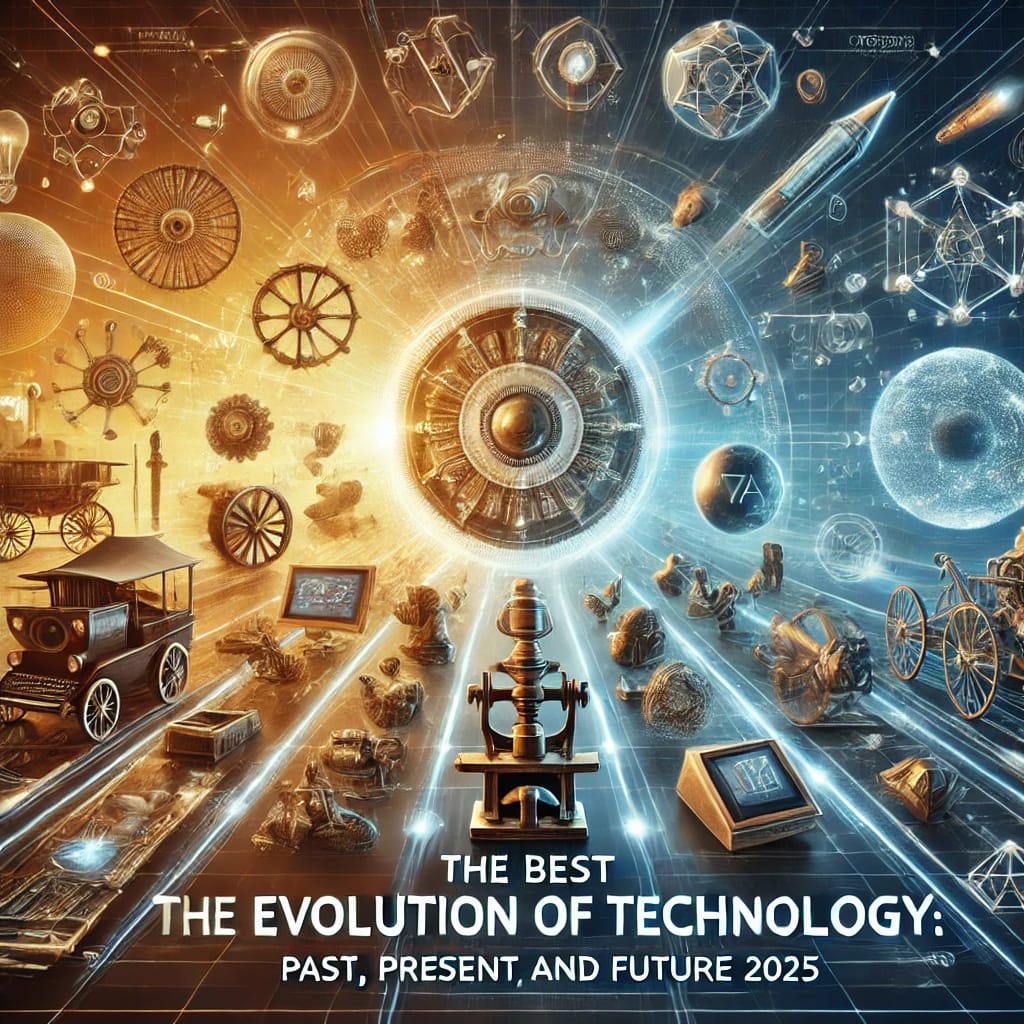Introduction
Technology has been instrumental in the evolution of human civilization. Every development has increased life’s efficiency and connectivity, from basic stone tools to advanced artificial intelligence. However, the journey of technology is amazing. This evolution allows us to appreciate the past, use the present wisely, and prepare for the future.
The Evolution of Technology
| Era | Key Technological Advancements |
|---|---|
| Ancient Times | The discovery of fire, the invention of the wheel, simple tools |
| Middle Ages | Printing press, navigation tools, mechanical clocks |
| Industrial Revolution | Steam engines, electricity, telegraph, mechanized manufacturing |
| 20th Century | Computers, the internet, space exploration, nuclear energy |
| 21st Century | Artificial intelligence, blockchain, quantum computing, biotechnology |
The Past: The Foundation of Modern Technology
In the early days of technology, it was a fight for survival. Early humans were able to settle down from hunter-gatherers because of fire, hunting tools, and primitive agriculture. The wheel made it easier to transport goods, and the printing press in the Middle Ages transformed knowledge-sharing. This was only a small change, of course, compared to the evolution later brought about by the Industrial Revolution. The emergence of electricity changed the game, bringing inventions like the lightbulb and telecommunication devices.
The Present: A Digital Revolution
The 20th and 21st centuries have been revolutionized by the power of digital technology. The advent of computers, the internet, and mobile technology has connected the world like never before. AI is already in the process of automating (certain) types of work processes and streamlining the functioning of units that make decisions. The quality of life is being enhanced by renewable energy, self-driving cars, and breakthroughs in medicine. Not only is technology easing our burden — it is altering how we engage with the world.
The Future: What’s Next?
As technology continues to evolve, the future looks promising. Some anticipated advancements include:
- Artificial General Intelligence (AGI): Intelligence that can understand, learn, and apply knowledge in a wide range of tasks, similar to a human.
- BCI (Brain-Computer Interfaces): Direct interface between humans (a.k.a. human brain) and machines.
- Machine Learning: Self-directed learning algorithms for data analysis and improved decision-making in various fields.
- Human Progress in the Universe: Exploring and colonizing Mars, advanced interplanetary travel, deep-space research.
- Biotech & Gene Editing: Personalized medicine, gene editing, enhanced human longevity
How Technology Impacts Everyday Life
Technology has changed almost every aspect of life. Here’s how:
- Communication: Everyone can talk internationally through instant messaging, video calls, and social media.
- Healthcare: Telemedicine, robotic surgeries, and AI-driven diagnostics have enhanced medical treatment.
- Some high-impact examples Include: Education: Online learning platforms and AI tutors have made education more accessible.
- Business: Automation, remote work, and digital marketing reshaped industries.
- Business: Streaming, gaming, and virtual reality have charted new paths of engagement.
FAQs
How has technology evolved?
Much has changed since tools for the hunting of animals brought us from dark caves to technology as advanced as AI. Every age has brought forth its innovations, each building upon the past, making life forward and interconnected more than ever before.
Technological Inventions of Maximum Importance
The list also includes one of the greatest inventions in the history of the world — the internet — a technology that has impacted communication, commerce, education, and virtually every industry around the globe.
How Will AI Change The Future?
Automation of various sectors will only further be propelled by AI and its capabilities; decision-making and analysis will be optimized and focused on areas of healthcare, finance, and customer service, to name just a few examples. Nevertheless, with power comes responsibility, and ethical concerns need to be addressed.
When will quantum computing be used in the future?
Quantum computing can solve highly complex problems at speeds never imaginable before, making significant advancements in fields such as pharmaceuticals, security, and artificial intelligence.
Does Technology Replace Jobs?
Yes, there might be job replacements in some professions due to automation and AI, but on the other hand, this technology might help create jobs in AI development, cybersecurity, and ultimately digital innovation.
Conclusion
Technologies have been continually developed better to shape how humans have lived, worked, and functioned. From primitive tools to AI, every discovery has contributed to a more efficient life. The future holds many possibilities with advancements in artificial intelligence, space exploration, and biotechnology. There will be more challenges but humanely-technological progress ensures human benefits of the technology.



